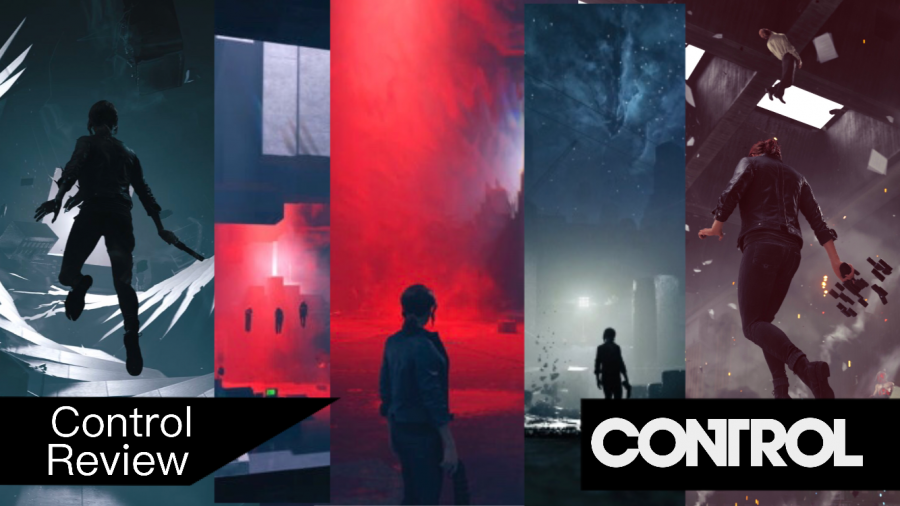Control: Ambitious, Visually Stunning, But Held Back by Limiting Hardware (Review)
I wasn’t quite sure what to expect going into Control, the latest game from studio Remedy (creators of games such as Alan Wake, Quantum Break and the Max Payne series), but having played and explored a vast majority of what it has to offer, I was absolutely blown away, and I can confidently say that it’s one of, if not, the most unique game of 2019.
The story is pretty experimental for a video game, and is such a delightful one to experience for yourself, that I’ll try to not spoil much of it, but the gist of it is fairly simple. You play as Jesse Faden (played by Courtney Hope), searching for a mysterious agency responsible for the kidnapping of her brother, known as the Federal Bureau of Control. After seemingly years of searching, she finally discovers it, hiding in plain sight as an unmarked concrete building in New York, and she enters to find a world of mystery plagued by an invasive force from another dimension, dubbed the Hiss. After the death of the previous ‘Director’ (the leader of the Bureau of Control), Jesse becomes the new Director and is tasked with stopping the Hiss invasion and saving the Bureau.
It’s a complex story that, as it unfolds over many hours of gameplay, becomes increasingly clearer with the introduction of new story elements, such as Objects of Power (or OOPs, as the characters call them) are what gives you different supernatural abilities throughout the course of the game. One power allows you to create a shield from surrounding debris, while another allows you to grab nearby items and launch them at enemies to deal damage.
The ability to grab and throw nearby items is one of the earliest powers you get, and when I first acquired it, I figured there would be a select few things to use the power on, but I was absolutely blown away to discover that almost anything in a room can be picked up and moved or thrown. You can even rip chunks of concrete out of the walls and floors, amazingly.
Control also features many ‘boss battles’, in which you’ll be facing different Hiss-infected characters that worked for the Bureau, and some much larger, more otherworldly enemies. In some games, boss battles can feel like a chore, often becoming overwhelming or punishing to the point of feeling like you’ll never beat the boss.
Strangely, Control’s boss battles never feel like this. Even when you die, and have to restart the battle (believe me, you’ll die quite a bit, as the game can often overwhelm you with a high volume of enemies), it seldom feels like you’ve been truly defeated. I had to play through a boss battle five times to get a handle on what was expected of me to be able to beat the boss, because I died due to not realizing new components had been introduced, as the boss’s spike legs could destroy the platform I was on, and I fell into through to my doom.
Ultimately, the failures you go through during boss battles in Control never feel like a true loss, but more like you’re getting a better handle on the mechanics of that specific fight, over and over, until you finally master it and defeat the boss, to a welcome sense of satisfaction.
Unfortunately, even with all its good, Control isn’t without issues. It has severe issues with its frame rate, meaning the gameplay can go from running smoothly, like a movie, to very choppy, like a slideshow. While it’s infrequent, it still happens enough to warrant talking about.
There are lots of very large-scale fights with enemies in the game, meaning that often times, there’s gunfire, explosions and debris in the environment getting thrown around that cause Control’s frame rate to drop tremendously, making it difficult to play or even see what’s happening, as during these fights, the screen is quite often flooded with bright, vibrant red lighting effects, explosions, debris, gunfire and more.
The loading times for the game when you fast travel between sectors of the building from the ‘Control Points’ (essentially places where you can upgrade Jesse, your weapons and travel between unlocked points through the building’s several floors), and after you die, are quite long. However, this is a fairly minor complaint, and doesn’t really detract from the overall experience, but one I felt worthy enough to bring up, as it becomes annoying very fast.
Additionally, away from technical errors, the main character Jesse, while I often enjoyed the way she was written and acted, she did feel a bit messy as a character. By which, I don’t mean intentionally, as her brother was kidnapped when they were younger, so she would be written like that on purpose, but more in the way that she feels like multiple different tropes for a main character smashed together.
As the game begins, Jesse often narrates, or has an ongoing internal monologue, but it quickly becomes apparent that she isn’t talking to herself, she’s talking to an extra-dimensional force (similar to the Hiss) that’s bonded to her. This allows for a very out-of-the-box take on an internal monologue and it allows the player to understand more of what Jesse is thinking without having a narration take you out of things.
As for the design and style of the game, the creative vision and artistic direction behind Control is simply beautiful and creative. I haven’t been so excited about, or intrigued by a video game’s world in a long time. Somehow, Remedy Entertainment (Control’s creators) have managed to take the base of a drab concrete building and infuse it with a brilliant color scheme of vibrant reds, as well as oranges and yellows, with greens and blues making occasional, understated appearances.
The facility that the Bureau of Control occupies is known as The Oldest House, a sort of living building that has the ability to change its layout. The layout of The Oldest House is split into five separate sections, each with its own purpose in the story, meaning no section feels wasted, and travel between all of them will be frequent.
In the game, you can find internal memos, notes, letters, research documents, audio recordings and much more that pertains to the strange world that exists inside the Bureau of Control. In any other game, I would pick these up and not bother to ever read or listen to any of them, but for some reason, the world, objects, events and characters that Control created were just fascinating to genuinely pull me in and intrigue me, making me deeply interested in this game’s strange, expansive lore.
One of the strangest parts (and one of my favorite parts) of Control is a strange entity or collection of entities simply called The Board. The Board is without a doubt one of the most unique elements I have ever seen in anything, with an origin that’s rarely talked about, and never fully explained. It talks to the Director of the Bureau, teaching them how to use their Service Weapon (which is a modifiable firearm that’s almost alive in itself) and how to wield their powers, both in general and in combat.
The Board is one of the most interesting parts of Control, and I never once found myself overly confused by their presence. In fact, I was always gripped whenever they made an appearance, as every small bit of their role in the game was so deeply intriguing, and it always left me wanting more, not less, which was perfect for a game all about drip-feeding you mystery and oddity.
Overall, the artistic direction of Control is astoundingly unique and is absolutely one of my favorite components of the game. The world feels special and remarkably original in the current landscape of video games. It’s certainly one of the most engaging and fascinating video game worlds I’ve had the pleasure of exploring, as every new part of the facility you’re in feels distinct and impossibly expansive.
Something that isn’t as immediately noticeable as the stunning look of Control is its gameplay and movement. The way Jesse moves around the environment is fast and fluid, occasionally to your detriment, as a mistimed Dodge can send you off of a ledge to your doom. Dodge, of course, is one of the earliest powers you unlock, allowing you to dash out of the way of enemy attacks before you’re hurt by them.
The powers you can unlock in Control are stupidly fun to play around with, whether you’re using the early Dodge ability to dash through destructible items in the environment (such as desks, tables, chairs and more) to rip them apart, or you’re using your Launch ability to throw nearby items at enemies, to even the late-game, absurdly fun Levitate ability, which obviously allows you to levitate in the air, avoiding some attacks. (The Levitate ability can also be combined with Dodge for some fun mid-air evasion.)
All of your powers require energy, a stand-in for a stamina bar, which depletes and recharges very quickly, but can be upgraded, along with the amount of health you have, and the strength or duration of certain powers you unlock.
Even when you’re not in immediate danger, it’s ridiculously fun to just play around in the environments where almost any piece of furniture can be destroyed, or moved around, or even just using simple but fun ways of getting around a room, especially during combat.
Ultimately, Control is without a doubt, absolutely, one of the most unique games of 2019, and it deserves much more recognition for its boldness and willingness to take chances, essentially being the video game equivalent to an “experimental arthouse film”.
It’s an out-of-the-box game, one that lures you in with its stunning visuals and fast, fluid traversal, but what ultimately keeps you hooked on Control is the core gameplay loop, the satisfying powers you can unlock, and its desire to tell a story that’s focused yet experimental and creative, and has something incredibly unique and new hidden almost everywhere you look.
Control is rated M for Mature, and is available now for PS4, Xbox One and PC.

I am a Senior in high school. My hobbies include writing fictional stories, playing video games, drawing, and taking photographs. My favorite of those...






